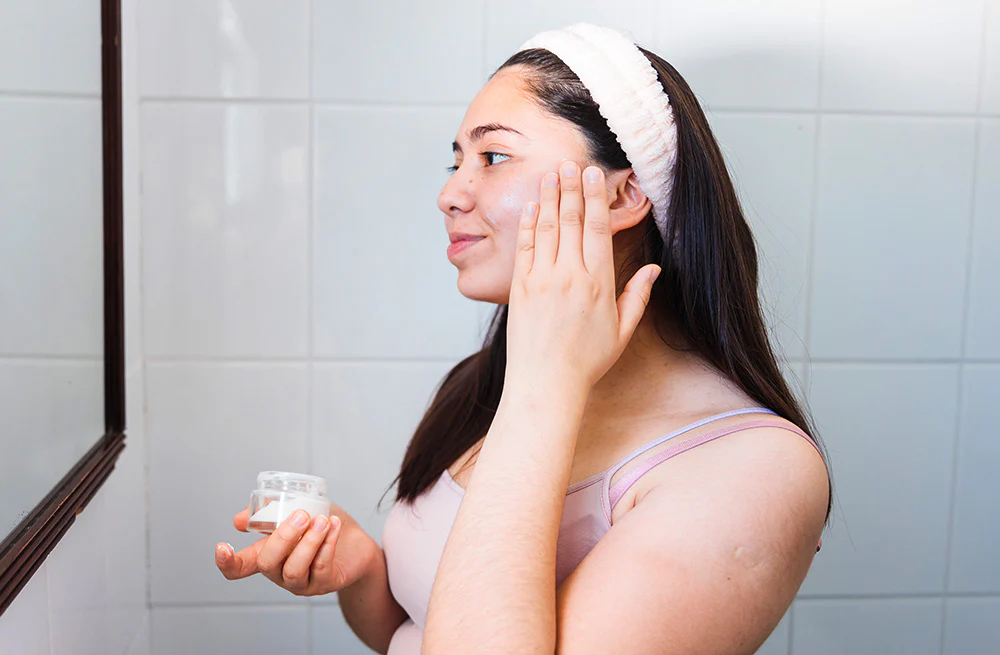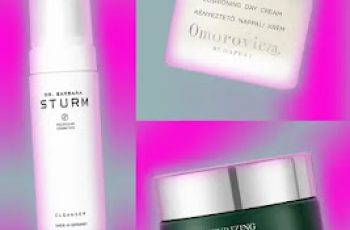Do face washes hurt or help acne? How to use the right moisturizer if your skin is acne-prone
Does moisturizer make acne worse? Since acne is caused by excess oil and dead skin cells that clog and irritate your pores, it would seem that using lotion can make it worse. This is true if the moisturizer you use contains heavy oils, waxes, or petrolatum. However, studies have shown that using a moisturizer with healing ingredients like retinoids or niacinamide can actually improve the signs and symptoms of acne. 1 This is especially true if you’re already using a topical treatment that can dry out your skin.
Read on to learn what causes acne, why it’s important to keep your skin moisturized, and what types of moisturizers you should add to your routine.
What causes acne?
Acne occurs when your hair follicles become clogged with oil and dead skin cells. These rashes can appear as blackheads, papules, pustules, or cysts and can leave scars. While acne can occur anywhere on the body, it’s most common on the face, chest, and upper back because these areas have more sebaceous glands.
There are a number of possible triggers for acne breakouts. These include:
Hormonal fluctuations, especially during puberty, menstruation, or menopause
Stress
Certain medications, such as steroids
Nutrition
Excessive sweating
Picking at the skin
Air pollution
Rough or oily makeup
Genetics
Acne treatments
There are many different treatments that can be used to clear acne, prevent breakouts, and heal scars. A healthy skin care routine is essential, starting with daily cleansing, wearing sunscreen, and breaking bad habits like picking.
Common acne treatments include the paraben-free benzoyl peroxide, salicylic acid, topical retinoids (such as tazarotene or Tretinoin), or prescription isotretinoin (for severe acne). While these types of products are very effective, they can also dry out the skin, cause burning and redness, or make the skin more sensitive to the sun.
If your acne is moderate to severe and doesn’t respond to other treatments, your doctor may also prescribe oral medications, such as antibiotic tablets or birth control pills.
Why Moisturizing Is Important for Acne
According to the American Academy of Dermatology, when your skin becomes too dry, your body increases sebum production. 2 Excess sebum can clog pores, leading to more breakouts, or making existing breakouts worse. Using the right moisturizer can prevent your skin from becoming too dry and irritated, especially when using strong topical acne treatments.
Using a moisturizer also protects your skin from acne by creating a physical barrier on the top layer of your skin, reducing sebum production. The right moisturizer is hydrating enough to lock in moisture and soothe inflamed skin.
What to Look for in a Moisturizer If You Have Acne
The best moisturizers for acne contain the following ingredients:
Labeled “oil-free.”
Non-comedogenic, meaning it won’t clog your pores
Moisturizers, such as hydrating hyaluronic acid
Acne-fighting ingredients like niacinamide, vitamin C, and azelaic acid
Soothing ingredients like aloe vera, vitamin E, and green tea
Moisturizers to avoid if you have acne
If you have acne, it’s recommended that you avoid moisturizers that:
Heavy oils, such as coconut oil
Waxes and petrolatum
Cocoa butter
Perfumes
Alcohol
Parabens
Peels that contain sodium chloride
Vitamin C Lotion 20%
Vitamin C Lotion 20%
Regular Price $45
Add to Cart
When and how to apply a moisturizer for acne-prone skin
Dermatologists recommend applying a moisturizer after washing your face with a gentle cleanser. Applying a moisturizer when there’s still some moisture in your skin will help retain moisture in your skin. You can also apply a moisturizer if your skin feels dry.
Studies show that most people experience a reduction in acne 4 to 8 weeks after they start using an acne-fighting moisturizer. 2
Acne-Recommended Foundation Skincare
The Foundation Skincare line offers a range of dermatologist-developed products to fight acne, without a prescription. All of these products are lotions that help lock in moisture and keep your skin well-hydrated. Whether you’re fighting current breakouts or trying to prevent future ones, use these acne moisturizers:
FS Night Renewal Cream contains 2% Granactive Retinoid and Essential Peptide Growth Factors along with herbal ingredients. The moisturizing formula delivers the skin-renewing benefits of prescription retinoic acid without the irritation.
FS Azelaic Acid 14% is the highest concentration of over-the-counter azelaic acid available. This skin-friendly antioxidant formula soothes and fights breakouts without irritating the skin like prescription formulas, but is more effective than other less concentrated over-the-counter products. In addition to killing acne-causing bacteria on the skin, azelaic acid disrupts the link between elevated testosterone levels and other hormonal changes, minimizing hormonal breakouts. The formula is gentle enough for sensitive skin and suitable for daily use as a soothing cream.
FS Niacinamide Lotion supports healthy oils in the skin while reducing sebum production to prevent acne breakouts. Its anti-inflammatory properties also soothe the redness and irritation of current breakouts while improving skin texture and minimizing scarring. The lotion is also gentle enough for sensitive skin and has a hydrating base that can be used twice daily.
FS Vitamin C Lotion contains a highly concentrated 20% active ingredient that reduces the redness caused by acne, boosts collagen production, and supports scar healing. Vitamin C Lotion also contains a hydrating base that moisturizes, brightens, and protects the skin without drying or irritating it.
When your skin needs more moisture, the best top product for daily use is FS Hyaluronic Acid Lotion, a fast-absorbing, intense moisturizer that locks in moisture and deeply hydrates for healthy, radiant skin. All products in the Foundation Skincare range can be layered with or without additional moisturizer. If you suffer from acne, we recommend the following routine.
Morning:
Cleanse skin with a gentle cleanser.
Apply FS Azelaic Acid 14%.
Moisturize skin with FS Hyaluronic Acid Lotion.
Use sunscreen with SPF 30 or higher to protect against sun damage.
Evening:
Cleanse skin with a gentle cleanser.
Apply FS Niacinamide Lotion.
Moisturize skin with Hyaluronic Acid Lotion or alternate with Foundation Skincare Night Renewal Cream with Granactive Retinoid.
DQH Knowledge drop: In your 20s, your skin cell turnover decreases. (Cell turnover is a key component in keeping your skin youthful.) You know what else slows down? Your collagen production. Starting in your 20s, collagen decreases by about 1 percent per year. Should you want to prevent fine lines and wrinkles, start by eliminating behaviors that contribute to premature aging. “If it’s bad for you, it’s bad for your skin,” says dermatologist Michel Somenek.
“Cigarette smoking reduces blood flow to the skin and causes premature wrinkling and a dull skin texture. Making the repeated pursed motion to inhale can also cause smoker’s lines. Alcohol and recreational drugs are toxins for the skin that damage its cellular structure and DNA,” Somenek tells us. “The faster you eliminate vices while you are young, the better chance your skin and body have to recuperate.” Also, adopting an anti-aging routine in your 20s is key. After all, the best offense is a good defense. We spoke to Somenek and experts Joshua Ross and Audrey Kunin to find out more.
Keep reading for the best anti-aging products for your 20s, according to skincare professionals.
Sunscreen
“We all know that the sun is the number one cause of skin aging and starting the prevention in your 20s is very important,” Ross says. “The majority of your sun damage won’t start to appear until you’re in your 30s, so don’t wait until you see it surface or you’ll be behind the curve. Stay ahead of it with a good-quality zinc-based sunscreen worn daily.”
Farmacy Green Defense Daily Mineral Sunscreen
An invisible sunscreen with SPF 30, plus botanical extracts meant to protect skin with tons of antioxidants. Bonus: It’s clean and fine to use under makeup.
Bareminerals Complexion Rescue™ Tinted Moisturizer Broad Spectrum SPF 30
Although we recommend you use your SPF and moisturizer separately, we also understand moments when you don’t have time or energy for that extra step. For those times, this bareMinerals moisturizer is a great thing to have on hand.
Vitamin C Serum
“A great introduction to anti-aging is to start with a vitamin C serum in your morning skincare routine,” Ross says. “It’s a powerful antioxidant that will neutralize free radicals and brighten the skin.” He adds that it’s a great way to counteract the effects of the sun’s harmful rays, which, as previously mentioned, are among the biggest causes of premature aging.
Drunk Elephant C-Firma™ Vitamin C Day Serum
The Drunk Elephant C-Firma is a lightweight serum that promises to give skin a glow by combining the brightening powers of vitamin C with ferulic acid, l-ascorbic acid, and vitamin E. The included sodium hyaluronate is meant to replace hydration loss, so you shouldn’t have to deal with any irritation.
Sunday Riley C.E.O. Rapid Flash Brightening Serum
This potent serum is jam-packed with vitamin C (15 percent, to be exact), which means it’s a potential superstar at both brightening skin and dousing it in antioxidants.
Peptides
Using peptides on your skin has many benefits, says Somenek. “The skin barrier is what defends the body against pollution, UV rays, bacteria, and toxins. It can be damaged by several everyday factors. Using topical peptides aids in building a stronger barrier,” he says. “Peptides comprise elastic fibers, which are a type of protein. These fibers help to make skin appear taut and firm. Peptides can also help repair damaged skin, relieve inflammation, and even out skin tone. Some peptides can kill acne-causing bacteria that is common in 20-somethings.”
Kunin agrees, saying, “Peptides are an excellent entry point for supporting collagen.” She recommends looking for face and eye treatments that contain these collagen-boosting powerhouses.
Charlotte Tilbury Magic Eye Rescue Cream
This Charlotte Tilbury super-emollient eye cream has a base of coconut oil and shea butter (read: it’s incredibly hydrating). Botanicals plus peptides are meant to help reduce dark circles and boost collagen, respectively.
This creamy moisturizer serves up potent collagen-boosting peptides and pycnogenol, and antioxidant-rich vitamin C. “Instead of sitting on top of the skin, peptides penetrate the outer layer so they go deep. The ‘signals’ they send tell the cells to produce elastin and collagen, which are needed for youthful-looking skin,” explains Somenek.
At-Home Peel Pads
Remember that skin cell turnover fiasco we talked about earlier? One way to help support it is by exfoliating. “Exfoliation is important to help keep skin fresh and luminous,” Kunin says. She recommends using at-home peel pads as an easy and effective way to exfoliate.
“The goal in your 20s is to fight the slowing pace of cell turnover. It is wise to use products that gently exfoliate, yet still remove oil and other impurities. Products that have Alpha Hydroxy Acids (AHA) or Beta Hydroxy Acids (BHA) are a good choice.”
According to Somenek, you should only exfoliate two to three times a week. “People of all ages are guilty of over-exfoliating and that can be too much of a good thing,” he says.
Dermadoctor Kakadu C Intensive Vitamin C Peel Pad
A few swipes of this Derma Doctor powerful peel pad promise to leave your skin glowing and smooth, thanks to the seven (yes, seven) types of chemical exfoliants, including AHA and BHA. It also contains vitamin C via Kakadu plum extract for added brightening and antioxidant protection.
KEY INGREDIENTS Kakadu plum extract is sourced from the Kakadu plum, a fruit grown in northern Australia. It contains vitamin C, which restores the skin’s natural barrier, increases collagen production, and soothes irritation.
Dr. Dennis Gross Skincare Alpha Beta® Universal Daily Peel Pads
These are the gold standard of peel pads, with a cult following and over 900 five-star reviews on Sephora. They’re easy to use and contain a blend of anti-aging exfoliating acids.
Emollient Night Cream
“In your 20s, you need to start upping the hydration in your skincare routine. You may have been cautious of over-moisturizing because of acne in your teens, but as you enter your 20s, your skin transitions and becomes drier,” Ross says. “I recommend an emollient night cream added into your evening skincare regimen.”
“Twenty-somethings need to make sure that they are not using creams that will clog their pores and cause excess oil production,” says Somenek. Opt for non-comedogenic products.
Cerave Skin Renewing Night Cream
One great choice is the CeraVe Skin Renewing Night Cream, which is a non-comedogenic night cream that leaves skin soft and glowy. It combines the moisturizing powers of ceramides and hyaluronic acid.
RoC Retinol Correxion Max Hydration Creme
“The best night cream ingredients contain retinol, benzoyl peroxide, and/or salicylic acid or hyaluronic acid. The goal is to moisturize, yet remove excess oil,” says Somenek. This Roc Retinol Correxion cream fits the bill as it contains both hyaluronic acid and retinol so it promises to moisturize while also being non-comedogenic.



